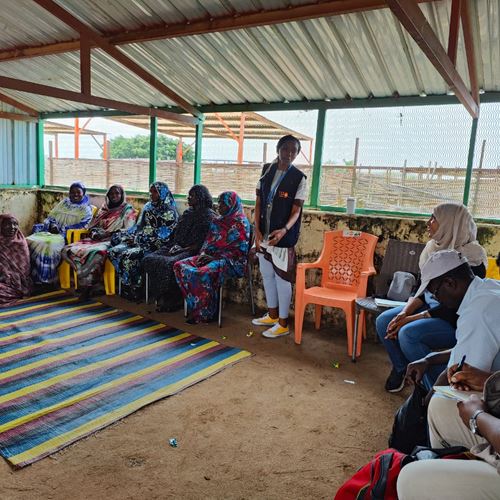Annie Waweru has now been deployed to Mogadishu, Somalia for three months, working to strengthen the coordination of the existing operations of the GBV sub-cluster at national level.
Aitor: Can you describe your typical workday?
Annie: My work as a GBV sub-sector coordinator is pegged on six core functions: supporting service delivery, informing strategic decision-making, planning and implementing cluster strategies and funding appeals, ensuring monitoring and evaluation, building national capacity in preparedness and contingency planning, and supporting advocacy. On a Sunday, for example, I attend the Inter-Cluster Coordination Group (ICCG) meeting, have a meeting or two with partners responding to their technical questions, and respond to queries from other clusters or OCHA, among many others.
I work towards building strategic relations for the cluster by networking, mainstreaming GBV in other clusters, partnering with other clusters for trainings on GBV prevention and risk mitigation, and so much more.
Aitor: Can you explain how the link between climate change and GBV is present in Somalia?
Annie: Climate change has fueled GBV in Somalia, as there has been an increase in the number of cases being reported. The prolonged drought has led to massive displacements and loss of livelihoods for families. The community has resorted to harmful coping mechanisms such as FGM and early marriage to survive.
These factors, including droughts, force people to leave their areas, and when fleeing, they lose the social structures rendering them vulnerable to GBV. The most typical scenario is the displacement from rural to urban areas for economic reasons. Climate change effects like drought increase vulnerability which causes girls to drop out of school and engage in commercial sex to contribute economically and feed their families. Families and communities have different mechanisms to address needs, but there is a lot of intolerance within families, and women are more vulnerable.
Aitor: The security level at your duty station in Mogadishu is substantial. How does this affect your work and life?
Annie: I live in a very safe compound with enhanced security. We live next to the beach, but you must stay in the Protected Area for security reasons. We walk to and from the beach in the protected area for exercise and to debrief after a long day at work.
Once, I had a difficult situation as I heard frightening news and was a bit scared. It was on the usual attacks by the Al Shabab. When I talked to the security colleagues, they told me nothing would go wrong if I followed the security instructions and procedures. I took heed and listened to the radio checks to be aware of the situation as well as checked the phone for updates from the security officer. This situation made me aware of all the security concerns that can be faced in Somalia and how responsive the DRC Standby Roster and UNFPA can be. Malaika of DRC and Kristine of UNFPA contacted me quickly, and I felt supported. They did not just deploy me but also performed a perfect duty of care. Such acts are comforting in a hardship duty station like Somalia.
Aitor: Did you face any challenges in joining a UNFPA office while being on contract with DRC?
Annie: I had no challenge joining the UNFPA because I was familiar with the structures, so I had no problem fitting in. The challenge was rather the new country and context of Somalia.
Aitor: What tools do you use to take care of your mental health? Do you have any resources that you use for managing stress linked to work and living abroad?
Annie: UNFPA pays attention to staff self-care and mental well-being. Also, I care for my mental, physical and emotional well-being by exercising, eating healthy and having a social life. There is a gym in the compound where I live, so I go every evening from 6 to 7. There are also recreational areas where we play table tennis and swim. I have a TV in my room, which I use to watch Netflix over the weekend to unwind. When I am stressed, I talk to my family and friends. I haven't felt burned out yet, but if I ever do, I know that I can reach out to the staff counsellor available to the staff 24/7. Living in a compound with other colleagues allows me to have social interaction and helps me relax and enjoy my free time.
